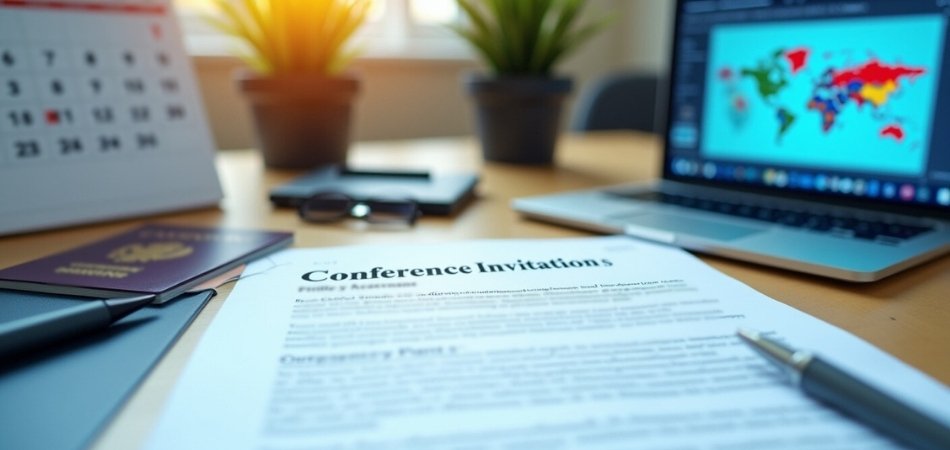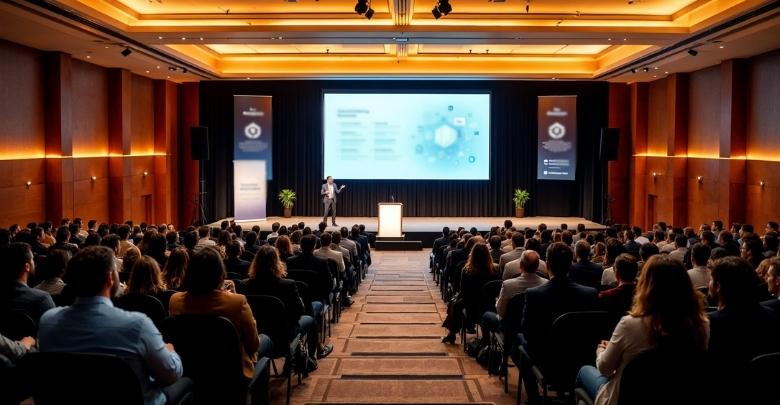Academic conferences bring together researchers, students, and professionals to share knowledge and exchange ideas. For many, getting into these events feels like a big step forward in their academic or career journey. But how do you get invited to an academic conference?
The answer lies in how actively you engage with your field. Submitting research papers, networking with professors or peers, and reaching out to conference organizers are all proven ways to secure an invitation. Many events also encourage early-career researchers and graduate students to take part, making opportunities more open than they might appear.
If attending an academic conference is your goal, this guide will show you the practical steps to make it happen. Keep reading to discover strategies, examples, and tips that can help you move from being an interested observer to an invited participant.
How Do You Get Invited to an Academic Conference?
Getting an invitation to an academic conference is not about luck; it’s about taking the right steps. Whether you are a student, a researcher, or a professional, there are clear ways to increase your chances of being invited. Let’s walk through them in a simple, step-by-step way.
Step 1: Build Your Academic Profile
Developing a strong academic profile is one of the most reliable ways to get noticed by conference organizers. Publish articles, contribute to research, and share insights in your field. When your work is visible and credible, invitations become much more likely.
Step 2: Look for Calls for Papers (CFPs)
Academic conferences often announce open calls for papers where participants can submit abstracts or proposals. If your submission is accepted, you’ll receive a formal invitation. This is a primary path for both early researchers and established scholars to secure participation.
Step 3: Network With Organizers and Scholars
Connecting with conference organizers, session chairs, or senior academics can make a real difference. Attend smaller events, introduce yourself, and engage in meaningful conversations. These relationships often translate into personal invitations to larger gatherings, including international ones such as a conference in Canada, the USA, the UK, or anywhere else in the world.
Step 4: Use University or Association Links
Universities and professional associations frequently collaborate with event organizers. Professors, advisors, or departments can recommend you for participation, especially in university conferences that often welcome students and early-career researchers. Academic associations also provide priority invitations or discounted registrations, helping you access opportunities that might otherwise be limited.
Step 5: Send a Direct Request
If you’re very interested in a specific conference, don’t hesitate to write directly to the organizers. A short, polite email explaining your academic background, interest in the event, and research focus can sometimes result in an official invitation to attend.
Sample Email Template: Invitation Request
Subject: Interest in Attending [Conference Name]
Dear [Organizer’s Name],
I am [Your Full Name], a [Your Position] at [Your Institution]. My current work focuses on [Your Research Area]. I am very interested in attending [Conference Name], as it aligns closely with my academic interests and ongoing research.
I would be grateful if you could let me know about the possibility of receiving an invitation to participate. Please find my short bio and abstract attached for your reference.
Thank you for your time and consideration.
Sincerely,
[Your Name]
Getting invited to an academic conference requires persistence, preparation, and the right approach. By building your profile, submitting research, networking, and reaching out directly, you can greatly increase your chances of securing an invitation. Stay consistent, and opportunities will come your way.
The 30-day Action Plan to Secure an Invitation
Getting invited to an academic conference doesn’t happen overnight; it takes planning and small steps that build up over time. By breaking the process into weekly tasks, you can stay organized and improve your chances without feeling overwhelmed. Here’s a simple month-long plan you can follow.
Week 1: Shortlist CFPs
Spend the first week researching upcoming conferences that fit your area of study or work. Look at academic society websites, university listings, or professional groups. Create a shortlist of at least five events, noting submission deadlines, location, and participation requirements.
Week 2: Draft Abstract & Bio
Dedicate this week to preparing your materials. Write a clear abstract that matches the theme of your chosen conference and create a short academic bio. Keep your bio professional, highlighting your research focus, achievements, and why your participation would add value.
Week 3: Submit & Contact Chairs
Now it’s time to act. Submit your abstract or proposal before the deadline. Alongside this, send a polite email to session chairs or organizers introducing yourself. Express your genuine interest in the event and ask about opportunities to contribute or attend.
Week 4: Follow Up & Prep Pitch
Don’t just wait in silence. Send a gentle follow-up email if you haven’t heard back after a reasonable time. Meanwhile, prepare a short pitch of your work that you can use for networking. This way, you’ll be ready when opportunities to connect appear.
Breaking the process into weekly tasks makes the goal of securing an invitation much easier. If you follow this plan with focus and consistency, you’ll steadily increase your chances of being invited to an academic conference.
Where to Find Calls for Papers and Invitations?
Finding the right academic conference starts with knowing where to look. Many researchers miss out simply because they don’t keep track of official platforms and societies that share these opportunities. With a little organization, you can always stay ahead. If you’ve ever wondered how to find academic conferences, here are some of the most reliable places to check.
EasyChair: This is one of the most popular online platforms where thousands of conferences publish their calls for papers (CFPs). You can search by field, deadline, or location, making it simple to discover relevant events.
Ex Ordo: Ex Ordo specializes in academic conference management and regularly lists CFPs for upcoming events. It’s a great place to browse both global and regional conferences, with options across different disciplines.
Academic Societies: Well-known academic organizations often announce CFPs directly on their websites. For example:
- ACM (Association for Computing Machinery): Leading in computer science and IT conferences.
- IEEE (Institute of Electrical and Electronics Engineers): Covers technology, engineering, and applied sciences.
- APA (American Psychological Association): Ideal for psychology, mental health, and social sciences.
University Departments: Many universities post CFPs for workshops, symposiums, and conferences they host. Checking your department’s announcements or newsletters can reveal opportunities you might not see elsewhere.
Official CFP Portals: There are many websites that gather worldwide CFPs across disciplines. They allow you to set alerts for your area of research, so you don’t miss important deadlines or chances to attend academic conferences near me and in other locations.
Calls for papers and invitations are everywhere if you know where to look. By keeping track of trusted platforms, societies, and portals, you’ll never miss a chance to apply. Stay active on these sites, and more opportunities will come your way.
Proven Paths to Get Invited
Getting invited to an academic conference takes more than just hoping for an email—it’s about taking clear, practical steps that organizers recognize and value. By focusing on consistent actions, you can raise your chances of standing out. Let’s look at ten effective strategies you can follow.
- Build a Strong Academic Profile: Publish research, write articles, and share your academic work online. A visible profile makes it easier for organizers to discover your contributions and consider you for invitations.
- Engage With the Academic Community: Join discussions, attend smaller events, and participate in forums. Being active in conversations shows that you’re committed and interested, which often leads to bigger opportunities.
- Submit Research Papers: Look out for calls for papers and submit your abstracts. Many conferences list conferences and papers invited on their official websites, making it easier to align your research with the event. Even if you’re not selected to present, some still extend participant invitations to contributors.
- Participate in University Programs: Universities often have direct links with international conferences. Ask your professors or department heads if there are openings or partnerships that could connect you to upcoming events.
- Follow Conference Announcements: Keep track of upcoming conferences through academic mailing lists, university boards, or professional networks. Many events post open invitations, speaker calls, or student opportunities.
- Join Professional Associations: Membership in associations like ACM, IEEE, or APA often gives you access to exclusive conference invites. These groups are a reliable pathway to meaningful participation.
- Request an Invitation: If you’re interested in a specific event, write directly to the organizers. A short, professional email that highlights your background and interests can sometimes secure you a spot.
- Gain Recognition in Your Field: Consistently share your work, publish in journals, and participate in smaller conferences. Recognition builds credibility, making it easier for organizers to invite you to larger events.
- Stay Active on Academic Platforms: Update your profiles on ResearchGate, Google Scholar, and LinkedIn. Conference organizers often look for experts on these platforms when sending out invitations.
- Utilize Mentors and Recommendations: Ask professors, colleagues, or supervisors to recommend you for conferences. A personal recommendation from a respected academic often carries strong weight with organizers.
These strategies may seem simple on their own, but together they create a strong foundation that increases your chances of being invited. Apply them consistently, and you’ll see more opportunities open up in the academic conference world.
Students: How to Get Invited to Conferences Quickly?
Students often wonder how they can secure invitations to academic conferences without years of experience or long publication lists. The good news is that there are direct routes available for students that make the process much faster. Many conferences even create invitation opportunities for graduate students to help them engage early in academic discussions. Here are a few strategies you can follow right away.
Advisor Recommendations
Professors and academic advisors are often connected to conference organizers. A recommendation from them can open doors quickly. Ask if they can nominate you for an upcoming event that matches your field of study.
Poster Submissions
Many conferences welcome students through poster sessions. These sessions are less competitive than full paper presentations but still offer excellent visibility. Submitting a poster is often enough to secure an official invitation.
Student Travel Grants
Large associations such as ACM and IEEE offer student travel grants that cover part of the cost and often include a formal invitation. These grants are competitive but very accessible if you prepare your application early.
Campus Partnerships
Universities frequently collaborate with conferences by sponsoring students to attend. Check if your campus has agreements with academic societies or if student associations are offering conference participation opportunities.
For students, securing an invitation is often about knowing the right channels rather than waiting for years of recognition. By using recommendations, poster opportunities, grants, and campus support, you can get into academic conferences sooner than you think.
Why Do Organizers Prefer Attendees With Strong Research Backgrounds?
Conference organizers want participants who bring value, not just numbers. Having a solid research profile makes you more attractive because it shows you can contribute meaningfully to sessions and discussions. Here are the main reasons organizers lean toward strong academic backgrounds.
- Credibility and Standards: Attendees with proven research make the conference more credible. Their presence assures others that discussions will be professional, reliable, and insightful.
- Engagement and Interaction: Researchers are more likely to ask thoughtful questions, join debates, and spark meaningful conversations, which makes sessions lively and productive.
- Sponsorship and Support: Sponsors often look at the quality of attendees. A strong academic crowd helps attract funding and support, which benefits the overall event.
A solid research background not only helps you personally but also strengthens the event itself. This is why organizers actively look for participants who can add depth and credibility to their conferences.
Funding & Travel Support Options
One of the biggest challenges in attending academic conferences is managing the cost. Thankfully, many organizations and institutions provide financial support to help cover registration, travel, and lodging. Knowing where to look and when to apply can make all the difference. Let’s explore some common options.
University Scholarships
Many universities offer internal scholarships or conference travel funds for students and early-career researchers. These typically require a faculty recommendation and proof of your accepted paper or poster. Deadlines are often set 2–3 months before the event.
ACM Student Travel Grants
The Association for Computing Machinery (ACM) offers grants that help cover travel costs for students presenting papers or posters. Selection is based on academic merit and financial need. Applications usually open once conference acceptance letters are released.
IEEE Travel Support
IEEE provides funding for students and young professionals in engineering and technology fields. Grants often cover airfare or partial conference expenses. Criteria include being an active IEEE member and presenting accepted research. Deadlines vary by specific conference.
APA Student Awards
The American Psychological Association (APA) gives travel awards to psychology students presenting at its conventions. Applicants must show proof of acceptance and submit a short statement of purpose. Deadlines are generally a few months before the annual meeting.
Sponsorship from Professional Associations
Professional associations in fields like healthcare, social sciences, and business often provide sponsorship opportunities. These may be competitive, but they typically require a strong academic profile and a recommendation letter.
Funding options are available if you prepare early and stay informed about deadlines. Whether through your university, associations like ACM or IEEE, or professional sponsorships, you’ll also find helpful funding options for international conferences that can ease travel costs. Always apply as soon as opportunities open.
Acceptance, Registration, and Visa Letters
If you’re planning to attend a conference abroad, knowing how acceptance, registration, and visa letters work can save you from unnecessary stress. Many first-time participants think getting accepted is the final step, but the process doesn’t stop there. Let’s break it down clearly so you know exactly what to expect.
Acceptance Before Registration
First, your paper, abstract, or participation request must be accepted. Only after you receive this confirmation will you be asked to complete the official registration form and pay the required fees.
Visa Letters After Payment
Most conferences issue visa support letters only after you register and pay. This ensures that the event is dealing with genuine participants. Without completing this step, you’re unlikely to receive the invitation letter needed for your visa application.
Required Details for Visa Letters
When requesting a visa letter, you’ll usually need to provide:
- Full name as written in your passport
- Passport number and nationality
- Date of birth
- Registration ID or confirmation number
- Planned travel dates
- Contact details and address
Mini Template for Visa Letter Request Email
Subject: Request for Visa Support Letter – [Conference Name]
Dear [Conference Organizer],
I have completed my registration for [Conference Name], with registration ID [Your ID]. I kindly request a visa support letter to assist with my travel application. Below are my details:
- Full Name: [As in Passport]
- Passport Number: [XXXXXXXXX]
- Date of Birth: [DD/MM/YYYY]
- Nationality: [Your Nationality]
- Travel Dates: [Planned Arrival and Departure Dates]
Please let me know if any additional information is required. Thank you for your assistance.
Sincerely,
[Your Full Name]
By completing registration first and providing clear details, you make it easier for organizers to process your visa letter request. Always check deadlines and requirements early to avoid last-minute issues that could affect your travel plans.
Common Myths About Academic Conference Invitations
It’s easy to get confused by what people say about academic conference invitations. Many of these ideas are myths that discourage potential attendees. Here’s a quick look at the most common ones and the facts that clear them up.
Myth: Only experts get invited
Fact: Conferences welcome students, early-career researchers, and professionals alike. If your work matches the theme, you have a real chance of being invited.
Myth: An invitation guarantees participation
Fact: You still need to complete registration, pay fees, or provide documents. Without these steps, your spot isn’t confirmed.
Myth: Paid invitations are always scams
Fact: Many legitimate conferences charge fees to cover venues and logistics. The important step is to verify the organizer’s credibility before paying.
Myth: Invitations are only for presenters
Fact: Many conferences invite attendees for networking, learning, and discussions. You don’t always need to present research to participate.
Myth: Big conferences never require invitations
Fact: Prestigious events often have strict rules. Some allow open registration, but many still ask for applications or formal invitations.
Having clear ideas about the difference between myths and facts helps you prepare better and avoid missed opportunities. Once you know what’s real, you can confidently take the right steps toward securing your place at an academic conference.
Frequently Asked Questions
Many readers still have small but important questions after learning how academic conference invitations work. To make things easier, here are answers to common doubts that often come up once you start planning to attend your first or next conference.
How Early Should I Start Preparing for a Conference?
It’s best to start at least three to six months ahead. This gives you time to write an abstract, arrange funding, and handle travel documents. Early preparation avoids last-minute stress.
Can I Attend Without Presenting Any Research?
Yes, many conferences allow participants to join as attendees only. You can still learn from sessions, network with experts, and meet future collaborators. Attending without presenting is a good starting step.
Do All Conferences Provide Certificates of Attendance?
Not all conferences issue certificates. Some only provide them for presenters or registered participants. Always check the event details in advance to see if having a certificate is important for your records.
Is It Possible to Switch From Attendee to Presenter Later?
In some cases, yes. If the conference has late-breaking paper sessions or poster slots, you may upgrade your role. You’ll need to contact organizers early to see if options are open.
What Should I Wear to an Academic Conference?
Most conferences recommend business casual clothing. If you’re presenting, a slightly more formal outfit is ideal. Always check the culture of your field and the host country’s norms before deciding.
Can I Get Support If English Is Not My First Language?
Yes, many conferences offer language support such as translation tools, bilingual materials, or volunteer interpreters. You can also practice with your advisor or peers. Asking organizers beforehand can help ease communication worries.
How Do I Follow Up After Attending a Conference?
Send short thank-you notes to people you connected with. Share your presentation slides online if allowed and stay active on platforms like LinkedIn. Following up helps you keep those new connections alive.
Concluding Lines
Securing a spot at a conference may feel complicated at first, but it becomes much clearer when you know the steps. From submitting research papers to reaching out directly, every action increases your visibility and builds your chances.
If you’ve been wondering how do you get invited to an academic conference, the answer lies in consistency. Build a strong profile, use academic connections, and stay updated with calls for papers. These simple habits open real doors to opportunities.
Conferences are more than events; they’re places where ideas grow, careers move forward, and new networks are built. Stay active in your field, keep sharing your work, and invitations will come. The more effort you put in now, the closer you’ll be to receiving yours.









